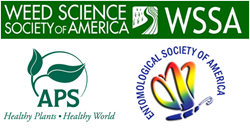The Pesticide Safety Education Program Reaches a 50-Year Milestone
Tuesday, October 7th, 2014
Lawrence, KS (PRWEB) September 15, 2014
Today scientists with the Weed Science Society of America (WSSA) joined with the American Phytopathological Society (APS) and the Entomological Society of America (ESA) to recognize the 50-year anniversary of the national Land-Grant University Pesticide Safety Education Program. Although the program has evolved over the past 50 years, it remains the focal point for pesticide safety education throughout the United States.
The Pesticide Safety Education Program (PSEP) had its genesis in 1964 to enhance pesticide label compliance and to develop the first training manuals. In the early years, the program was under the direction of each Land-Grant University’s Cooperative Extension Program and was supported by the U.S. Department of Agriculture (USDA). In 1970, USDA passed the safe-use education torch to the newly created U.S. Environmental Protection Agency (EPA), which concentrated especially on safety issues on the farm and in other occupations.
In 1978, EPA classified the first 12 restricted-use pesticides (RUPs). Applicators were required to demonstrate competency to apply RUPs, and Pesticide Applicator Training (as PSEP was then called) served as the primary developer and deliverer to inform and educate on safe pesticide use.
The reach of the Pesticide Safety Education Program has expanded greatly over the years. There are many more RUPs, and many states now require whole categories of users to be certified, even if they do not apply RUPs. Examples include certification of hired applicators, public employees and those treating schools or aquatic environments. In fact, an estimated 40% of certified applicators in the U.S. today do not apply RUPs.
Though it once focused predominantly on the education of applicators controlling agricultural pests, PSEP now teaches applicators working in urban, natural, industrial and other settings. It provides training to those who control weeds, insects, disease-causing organisms, rodents and other pests in forests, structures, turf, ornamentals, rights-of-way, aquatic areas, and other important and sometimes unique “sites.” These include food manufacturing and processing establishments, interior plantscapes, pet grooming, pools, public health, seed treatment, sewers, water sanitation, wood preservation and more. In addition, PSEP impacts more than one million pesticide users in the general public who apply pesticides in their homes and on their lawns, gardens, ornamentals and pets.
Last year, approximately 900,000 certified applicators in the U.S. applied pesticides or supervised their use. Many more individuals who did not require certification sold, transported, stored, mixed, applied, disposed or were otherwise involved in the life-cycle management of pesticides. To reach all these audiences, PSEP and its not-for-profit partners provided in-person and on-line training sessions, distance education, manuals, brochures, presentations and videos. Today you can surf the web for pesticide safety education in any state to locate resources developed by PSEP. These resources promote safe handling of pesticides and protection of applicators, workers, the general public, beneficial organisms and the environment.
Everyone benefits from a strong national Pesticide Safety Education Program – the general public, the registrants whose products’ availability depends on safe use, the applicators who must be competent in the safe use of pesticides, the expanded network of trainers educated by PSEP and the regulatory agencies that enforce the law.
The recognition this program deserves is often muted, due to the increasing number of organizations and initiatives that erroneously equate pesticide safety education with promoting pesticide use. On its 50th anniversary, the WSSA, APS and ESA salute the Pesticide Safety Education Program in the Land-Grant Universities and in the territories for its many efforts to protect human health and the environment, as society continues its ongoing battle against pests.
About the Weed Science Society of America
The Weed Science Society of America, a nonprofit scientific society, was founded in 1956 to encourage and promote the development of knowledge concerning weeds and their impact on the environment. The Society promotes research, education and extension outreach activities related to weeds, provides science-based information to the public and policy makers, fosters awareness of weeds and their impact on managed and natural ecosystems, and promotes cooperation among weed science organizations across the nation and around the world. For more information, visit http://www.wssa.net.
About the American Phytopathological Society
The American Phytopathological Society (APS) is a nonprofit, professional scientific organization. The research of the organization’s slightly less than 5,000 worldwide members advances the understanding of the science of plant pathology and its application to plant health. For more information, visit http://www.apsnet.org.
About the Entomological Society of America
The Entomological Society of America (ESA) is the largest organization in the world serving the professional and scientific needs of entomologists and people in related disciplines. Founded in 1889, ESA today has more than 6,000 members affiliated with educational institutions, health agencies, private industry and government. Members are researchers, teachers, extension service personnel, administrators, marketing representatives, research technicians, consultants, students and hobbyists. For more information, visit http://www.entsoc.org.

